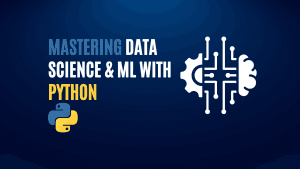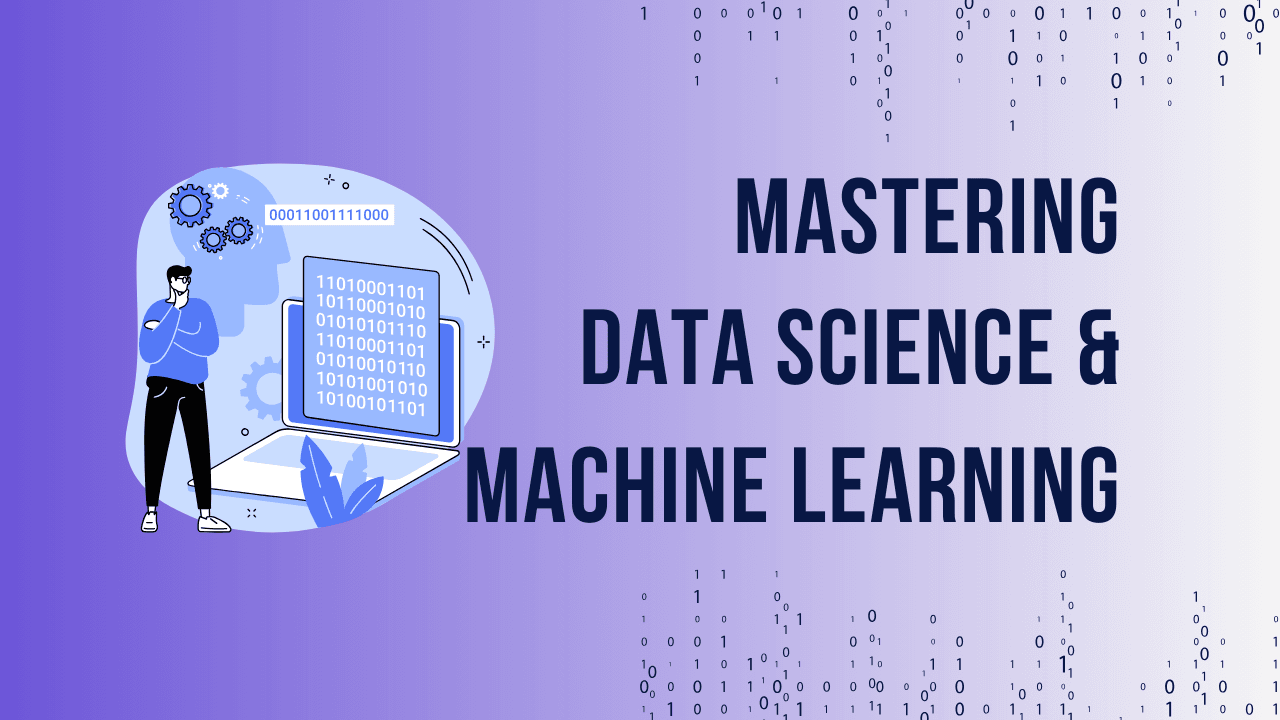In today’s data-driven world, becoming a proficient data scientist requires a solid understanding of several key concepts, tools, and skills. Data science is a vast field that integrates mathematics, statistics, computer science, and domain knowledge to derive actionable insights from data. But what are the essential things an ideal data scientist should know? This blog explores the fundamental knowledge and skills needed to excel in the field of data science.
Ready to take you Data Science and Machine Learning skills to the next level? Check out our comprehensive Mastering Data Science and ML with Python course.
Table of Contents
Toggle1. Strong Programming Skills
One of the first things that an ideal data scientist must know is programming. It’s essential for handling data, performing analysis, and implementing machine learning algorithms. Two of the most popular languages used in data science are Python and R.
- Python: Known for its simplicity and readability, Python offers a wide range of libraries such as NumPy, Pandas, Matplotlib, and Scikit-learn, making it perfect for data manipulation and machine learning tasks.
- R: Particularly strong in statistical computing, R is widely used in academic research and in industries that require heavy statistical analysis.
Learning at least one of these languages is crucial for any aspiring data scientist.
2. Knowledge of Statistics and Mathematics
A deep understanding of mathematics and statistics forms the backbone of data science. Key areas include:
- Probability: Understanding probability is fundamental for data modeling and decision-making.
- Linear Algebra: Algorithms in machine learning rely heavily on concepts like matrices and vectors.
- Calculus: Helps in optimizing algorithms, especially in neural networks and other machine learning models.
- Hypothesis Testing and Statistical Significance: Critical for determining the accuracy and reliability of your data findings.
Without a good grasp of these concepts, data scientists might struggle with interpreting data accurately.
3. Data Wrangling and Cleaning
Raw data is often messy and requires cleaning before it can be analyzed. Data wrangling refers to the process of cleaning, structuring, and enriching raw data into a usable format. This involves:
- Handling missing values: Filling or removing gaps in the data.
- Outlier detection: Identifying anomalies that could skew results.
- Feature engineering: Creating new features that make the data more understandable and usable.
An ideal data scientist spends a large portion of their time on data wrangling, as clean data is essential for accurate analysis.
4. Expertise in Machine Learning Algorithms
Understanding machine learning algorithms is vital for developing models that can predict outcomes and uncover patterns in data. Some key algorithms that data scientists should be familiar with include:
- Linear Regression: A foundational algorithm for predicting a continuous outcome variable based on one or more predictor variables.
- Decision Trees: Used for classification and regression tasks, decision trees are simple yet powerful tools.
- Random Forest: An ensemble learning method that builds multiple decision trees and merges them to improve accuracy.
- K-Means Clustering: An unsupervised learning algorithm for grouping similar data points together.
- Neural Networks: Complex models used for tasks like image recognition and natural language processing.
Learning how to implement these algorithms in Python or R is essential for an aspiring data scientist.
5. Data Visualization Techniques
Data visualization is an essential part of data science as it helps communicate findings to non-technical stakeholders. Tools such as Tableau, Power BI, and libraries like Matplotlib and Seaborn in Python allow data scientists to create visually appealing and informative graphs, charts, and dashboards. Data visualization makes it easier to identify trends, outliers, and patterns in the data
Ready to take you Data Science and Machine Learning skills to the next level? Check out our comprehensive Mastering Data Science and ML with Python course.
6. SQL for Database Management
SQL (Structured Query Language) is the standard language used to communicate with databases. A data scientist should be proficient in SQL for tasks such as:
- Extracting data from relational databases.
- Query optimization to improve performance.
- Data manipulation within large datasets stored in databases.
Although modern tools can automate some of these processes, understanding SQL is crucial for working with structured data stored in databases.
7. Familiarity with Big Data Tools
In today’s world, businesses deal with vast amounts of data. An ideal data scientist must know how to handle big data, which traditional data processing tools can’t manage. Some essential big data tools include:
- Hadoop: A distributed storage and processing system for large datasets.
- Spark: An open-source big data processing framework that supports real-time data processing.
Knowledge of these tools helps data scientists manage large datasets more efficiently.
8. Understanding of Data Ethics
With the increase in data collection and analysis, data ethics is becoming more important. Data scientists should be aware of:
- Data privacy laws: Regulations like GDPR (General Data Protection Regulation) that protect user privacy.
- Bias in algorithms: Ensuring that data models do not perpetuate societal biases.
- Transparency: Being open about how data is collected, processed, and used.
Ethics plays a key role in building trust in data science practices.
9. Domain Knowledge
An often overlooked but critical aspect of being a data scientist is domain knowledge. Whether working in healthcare, finance, retail, or any other industry, understanding the specific challenges and needs of that field helps in developing more effective data solutions.
10. Staying Updated with Trends
Data science is a rapidly evolving field, and an ideal data scientist must keep up with the latest developments. This can involve:
- Following top industry blogs and forums.
- Participating in online courses.
- Engaging with the data science community.
Continuous learning is key to staying competitive in the job market.
FAQ Section
1. What is the most important skill for a data scientist?
The most important skill for a data scientist is programming, particularly in Python or R, as it allows them to work with data and implement machine learning algorithms.
2. Why is domain knowledge important for data scientists?
Domain knowledge helps data scientists understand industry-specific challenges, enabling them to develop more relevant and effective solutions.
3. How do data scientists handle big data?
Data scientists use big data tools like Hadoop and Spark to process large datasets that cannot be managed by traditional methods.
4. What role does ethics play in data science?
Ethics ensures that data is collected, analyzed, and used responsibly, particularly in regards to privacy and bias in algorithms.
5. Do data scientists need to know SQL?
Yes, SQL is essential for managing and manipulating structured data in databases, which is a key part of the data science process.
6. How do soft skills benefit data scientists?
Soft skills such as communication and collaboration help data scientists explain their findings to non-technical stakeholders and work effectively in teams.
Ready to take you Data Science and Machine Learning skills to the next level? Check out our comprehensive Mastering Data Science and ML with Python course.



